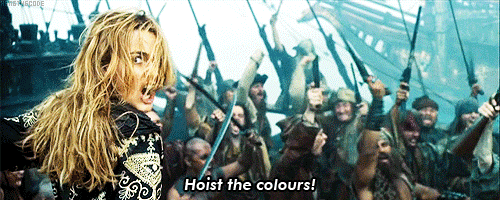What do you think?
Rate this book


456 pages, Hardcover
First published February 28, 2017
Actual rating: 3.5 stars“Our lives are before us, not behind.”
“That depends on where you’re standing on the timeline.”
A couple of months ago when I first held The Girl from Everywhere in my hands, I was expecting a really fun read with adventures, time-travel, hot Persian thieves and an unforgettable image of the 19th century Hawaii. In the end I definitely got my adventures with the charming thief and authentic image of Hawaii, the time-travel part though, wasn't fully explained, and some serious holes in the concept of the Navigation system presented in the book, couldn't let me rest in peace. I was waiting for the sequel to dispel my doubts and satisfy my curiosity. Now after finishing The Ship Beyond Time I am torn: from one side, the sequel definitely answered most of my question, but, from the other side, more appeared and the way Heidi Heilig handled those new questions wasn't 100% satisfactory.
>> The best addition to the book was Kashmir's POV. Finally!! we can see what's going on in the handsome head of his. I must say, Kashmir's fears and doubts really resonated with me. We knew that his homeland is actually a myth, the one you will never find on any maps, so the question Kashmir asked himself time and again: Am I a real boy? Or am I a figment of Navigator's - Nyx's - imagination, because it's always up to the Navigator whether they believe in the place they want to visit and thereof making it true.“Then I saw the Temptation gleaming like fool’s gold on the black water, and my anger returned. The ship was hers too; everything was hers. The room where I slept, the life she had saved . . . had she created it in the first place? And even now, my heart. All hers.
I was not a jealous man—it wouldn’t bother me at all if only I had something of my own. So what was mine? The coat I wore? Bought with stolen gold. The money in my pocket? Taken from the harbormaster. I pulled out the handful of tarnished silver; it gleamed dully in the moonlight. I cast the coins into the harbor like dice, like bones. They tumbled into the water and I watched the ripples disappear as though they’d never been.”
>> The above leads me to the the time-travel part: can you change you fate? What if by trying to change the past, you actually trigger the things that will lead to shaping the future as you know it; what if you are the reason things the way they are? And what if you never interfered with the past in the first place: what would the future be like? I must say, that I loved how the author challenged her characters with these questions. It's really hard to grasp the whole concept of cause an effect, like what was first: an egg or a chicken? Does fate exist or the future can be changed? Plus, there's also an ethical question: The Navigators (people who time-travel) interfere with the past, therefore messing with other people's lives: what if their arrival triggered an event, and that event changed the fate of a person, and to somehow level the damage, time creates a fork: one world where a person exists as they were supposed to be before the Navigator's interference, and the other world where changes occurred, and a person wouldn't remember parts of their life these changes touched. I don't know if you get my point, because it's really hard to grasp the whole concept of the multiverses and its consequences, but the whole idea is really fascinating.
“And what of the memories Nix had claimed to have? The memories I was missing? Was my mind so malleable a stranger could change it? Were all of my thoughts now suspect? The wounds and the wonders I’d carried from my youth—the dreams and desires I’d fostered for my future . . . the love and longing for the girl who’d stolen my heart?”
>> Despite my excitement for the time-travel concept, what I was never a fan of - or better say - was never satisfied with is like the author presents the whole Navigation thing to us. I mean, sure, she added time-travel with multiverses to the book and it's really cool, but she never really explained how the whole Navigation happened in the first place: in book 1 we just had a vague explanation that a person just have to close their eyes and dream of the place they wanted to visit. Of course, you have to have a map of the said place, and you can't travel twice in one place, but the devil is in the details, and here I got some kind of subterfuge: don't ask questions about how the navigation works, just swallow the multiverse pill and be happy. No, the world-building doesn't work that way, Ms. Heilig, especially when you add the real physics concept to your imaginary world, be kind enough to match and explain both.
>> I absolutely love the places author chooses for adventures in her books: characters visit real historical places and imaginary worlds: myth, utopia, someone else's fantasy - doesn't matter what it is, because it's always so fascinatingly done, you feel yourself wanting to visit these places too.
>> The love triangle disappeared like it never was here in the first place: which, from one side, is definitely good, because I hated that stupid love-triangle, but, from the other side, you can't just brush out the second love interest the heroine seriously considered the life with in book 1. Like what? Why all of a sudden Nix switched to Kashmir (not that I minded) and forgot all about Blake? I'd just liked a more subtle transition maybe? Of course, I absolutely loved all Kashmir moments (hot times are guaranteed):
“Why? Don’t you know why you love me?”
“I know that I’m happiest at your side,” I said fervently. “I know that when we’re apart, my heart is with you, when we disagree I still want you near. It’s like I was made for you, amira, but I don’t know why.”
“Kashmir . . .” She laughed a little in disbelief. “That’s . . . that’s what love looks like.”
“But is it only a trick of Navigation?” I asked, nearly pleading. “And if so, what is truly mine?”
“I am.”
Her words took me by surprise. She said it so simply—so quiet, so true. Only two words, three letters, one breath, but never had a promise held more meaning. She turned to me then, and in her eyes, I saw not oblivion, but infinity, and the stars were not as bright as her smile.”
But, honestly, sometime Nix's fixation on saving Kashmir from loosing him in the future was borderline obsessive and annoying: at times she resembled a mad woman mumbling all the time, I don't want to loose you Kash, I don't want to loose you... *sigh* The girl can be really daft.
“Do you regret it, amira?”
“Regret . . . what?”
“Meeting me. Knowing me.” He searched my face. “Loving me.”
Everything seemed to stop at the word; it hung in the air between us, tangible and real. “No,” I said at last. “No.”
“But you fear you will someday. That’s why you hold back. That’s why you want to know you can change things before you commit.” He let go of my hand and stood. The distance between us ached like the cold of a winter sea. “You watched your father chase your mother for years, and you wished he didn’t love her. What will you do to my memory when I’m gone? Will you chase it like a dragon? Or will you banish it like smoke?”
>> Some of the characters' actions were questionable in the logic department, and some plot moves didn't add up as well. It's hard to explain without spoilering anything major, so here goes the spoiler part if you read the book
>> The ending was great! I think it's the best part of the book (apart from Kashmir) I loved in this story. I appreciated that the author left some 'cosmic' questions unanswered; the ending is left open with the possibility of more books (so far it's a duology) or the possibility for us, readers, to interpret the consequences of the characters' actions as we wish.
All in all, The Ship Beyond Time was definitely an adventure worth exploring if only for Kashmir, time-travel, imaginary worlds, and freedom of choosing your next destination, feeling the breeze of possibilities in front of you. I wish I could hop on a ship and go on adventure wherever I want. *dreamy sigh* I love the light sense of sadness I am left with after the book is finished, I love that the book made me grip its pages in worry for characters' fates. I love that there's an open ending and not everything is agreed upon. Maybe there will be more books someday, the author definitely left space for that, but if not, I wouldn't be sad either, because some question better left for readers' imagination to decide what fate for our characters lingers on the horizon...

"It's never up to you what happens. Your only choice is what to do when it does. What kind of person will you decide to be?”
“You’ve fought me for years, but now that it’s about Kashmir—”
"What did you really expect, Slate?” My voice shocked me—the anger in it. “After all this time watching you, what did you think I would do?”
"I don’t know!” he shouted, flinging his arms into the air. “Maybe learn from my mistakes?”
"I did,” I shot back. “Just not the lessons you thought. And now I have the chance to learn from experience.”
Looking at Slate, his bent shoulders, his hollow eyes—I knew I could not let it happen to me. I would not end up like my father.
“You won’t find Vaadi Al-Maas on any modern maps.”
"Because it was a myth.”
I bit my lip. “Yes.”
"Then what am I?”
"Kashmir—”
"If you can create a myth, why not a man? Am I merely a figment of some cartographer’s imagination? Or did you make me up when you arrived?”
"No, Kash. I . . . No. Don’t say that. You are . . . you’re very real to me.”
But it wasn’t what he needed to hear. He shook his head. “I need to be more than what is reflected in your eyes. Otherwise . . .”
For a moment, he was at a loss for words, and the confusion of it made him look so young.
"Otherwise what?”
"Otherwise what am I without you?”
“So I should do nothing? You want to be lost?”
"Of course I don’t! But I don’t want to lose you either.”
"You won’t.”
"I already am.” His voice was bitter; he kicked at a bottle cap. “There’s a wall around you now, amira. You built it with your father. I don’t know who holds the key.”
"Regnabo, regno, regnavi, sum sin regno.
I shall reign, I reign, I have reigned, I have no kingdom."

